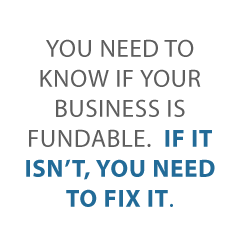This blog may contain affiliate links that might result in Credit Suite receiving a commission if you use them. This has no impact on the price you are charged for the product or service.
Many of us analyze ourselves mercilessly in the mirror. We pick apart every flaw and consider how we might change or improve each one. While that may or may not be a positive activity, in the same way, you can improve the success of your business by reflecting on what is working and what is not. An analysis of fundability is one way to do this.
How to Analyze the Fundability of Your Business and Make Positive Changes
Take a step back and look at your business in terms of fundability. Does your business appear fundable to lenders? What does that even mean? It means your business appears to lenders to be one that they can lend to with little risk. Risk of what? The risk of you not paying back your debt. They don’t make money if you don’t pay, and they are definitely in it for the money.
How do you make sure that’s the case for you? You need to analyze the fundability of your business. There are hundreds of factors that can affect fundability. The fact that they all interconnect and affect each other further complicates things. As with all things, the best place to start is at the beginning, the foundation, if you will.
Check out our best webinar with its trustworthy list of seven vendors to help you build business credit.
The Foundation of Fundability
The first thing you need to look at during this analysis is how your business is set up. It makes a difference. In fact, it makes a big difference.
Dedicated Contact Information
For example, you need a physical business address where you can receive mail. A P.O. Box or UPS box will not cut it. Furthermore, you need a business phone number that is listed in the 411 directory. It should also be toll-free.
This can happen in a couple of ways. With the phone, you can get a separate phone line and have a separate business location. This is pretty standard. If you run your business from home, you get a virtual office address and a VoIP (Voice over Internet Protocol) business phone number. Basically, VoIP allows you to speak on the phone via the internet instead of phone lines. VoIP phone numbers can typically be forwarded to any number you want, meaning you do not have to get a dedicated line to have a dedicated number.
A virtual address service will often offer other services as well, such as live receptionists. Be aware however, some lenders do not like virtual addresses.
Why does your business contact information need to be separate from your own? There are a number of reasons, but for fundability there are two. First, it makes your business seem more professional. In a lender’s eyes, this lends itself to appearing more fundable.
Next, it creates the separation needed between business and owner to ensure the business can build credit separate from the owner’s personal credit. While this isn’t the only step necessary for separation, it is a necessary step.
EIN
Another thing to look at in your analysis of fundability is whether your business has an EIN. A lot of business owners, especially those running their business as a sole proprietorship, tend to use their social security number on business documents. However, an EIN is a much better option.
This not only further separates the business from the owner, but appears more professional, and therefore fundable, to lenders as well. In addition, it helps ensure that business credit accounts stay off your personal credit report.
You can get an EIN for free from the IRS. The process is fast and easy.
Incorporation
As mentioned before, many small businesses run as a sole proprietorship because it is easiest and cheapest. However, when this comes up in your fundability analysis, you are going to need to change it. Incorporation is a vital part of fundability.
There are several reasons for this. Again, incorporating creates the separation from owner necessary for building business credit and appearing fundable to lenders. However, it also helps protect your personal assets should the business struggle.
What does not matter, is which option for incorporation you choose. Whether you incorporate as an LLC, an S-corp, or a corporation does not make a difference when it comes to creating separation and fundability.
Each option comes at a different cost and with varying levels of liability protection. Choose which one is best for you based on your budget and the level of liability protection you need. Usually, it is best to talk to an attorney or tax professional, when making this determination.
Note that it is abundantly better to incorporate from the first day of operations. This is because, whenever you do incorporate, you lose time in business and payment history from when you were in operation as a sole proprietorship or a partnership. This means the longer you wait, the more backtracking you will have to do. Not incorporated yet? Now is definitely the time.
Separate Business Bank Account
The next step in your analysis of fundability is to take stock of your business bank account. Is it the same as your personal account? That won’t work. You need a separate, dedicated business bank account.
For one thing, this again creates the separation necessary to build business credit, which is a huge piece of being fundable. However, there are also a few different types of financing that are only available if you have a business bank account.
For example, you cannot get a merchant cash advance without a business bank account, and you cannot get a merchant account to accept credit card payments. Studies show that customers spend more when they can pay with a credit card. Also, several business credit cards want to see a business bank account. These are both in addition to lenders that may want to see a business bank account with a minimum average balance before approving a loan.
Check out our best webinar with its trustworthy list of seven vendors to help you build business credit.
Analysis of Fundability: Consistent and Professional Public Presence
This part of fundability can get pretty complicated because it has so many interconnecting pieces. The consistency part can be especially daunting because it goes all the way back to the start of your business. If it has been in operation for a while, you can see how that could be an issue.
The thing is, most business financing applications are denied due to fraud concerns. This can be an issue for you if you have different information across various records. All names, contact information, etc. needs to be consistent when it comes to public records, accounts, websites, social media, licenses, and anything else you can think of.
In addition, you need to pay careful attention to your online reputation. If you have poor reviews or a ton of complaints, you could run into fundability problems. This includes both online review sites and the Better Business Bureau.
Another important piece here is your company website. First, you have to have one. However, it can’t just be something you throw together. It needs to be professionally designed, and you need to pay for hosting. Your business email address needs to have the same URL as your website also. You shouldn’t use a free email service such as Yahoo or Gmail.
Analysis of Fundability: Business Credit
The next thing you have to consider when you do an analysis of fundability for your business is your business credit score. First, do you even have one? If your business isn’t set up to be fundable as discussed above, probably not. That’s your first step. Once that is done, you have to get accounts reporting to the business credit reporting agencies to start building your credit score.
Get a D-U-N-S Number
Dun & Bradstreet is the largest and most commonly used business credit reporting agency. Each business in their database has a D-U-N-S number. If you do not have one, they will not recognize you and any accounts reporting will be discarded. You must have this number. You can get one for free on their website here.
Experian has a similar number known as the BIN. Find out more about that here.
Other Agencies
Other agencies can affect your fundability as well. For example, there are two other main business credit reporting agencies. They are Experian and Equifax. Your record with these and other agencies can affect your ability to get funding.
Other credit agencies do exist and some lenders do use them. CreditSafe and FICO SBSS are just a couple of examples. In addition, your file with LexisNexis and The Small Business Finance Exchange can affect your business credit score, and thus your fundability.
Work with Starter Vendors in the Vendor Credit Tier
The vendor credit tier is the best place to get started when it comes to building business credit. Many of the vendors in this tier will extend net terms and report payments, without doing a credit check. Instead, they will rely on length of time in business and income to determine eligibility.
Monitor Your Business Credit
The last step in building business credit for fundability is to monitor your business credit. This should be an ongoing step in your analysis of fundability as well. You need to stay on top of which accounts are being reported for one thing. This is how you will know you can move on to the next tier. Even after this though, you need to know where things stand.
If you find mistakes, you can contact the reporting agency in writing and have them corrected. Be sure to send copies of backup documentation, not originals.
We can help you monitor your business credit for a fraction of what it will cost with the CRAs.
Analysis of Fundability: Your Financials Matter, Both Business and Personal
If you are a very small business, you may not give much thought to your financial statements. When you are doing an analysis of fundability, you have to however. You need to know how to read them, and how to understand what they are telling you.
Details such as whether you are turning a profit and what assets you have available for collateral will make a difference to lenders when they are making fundability decisions. They will need to see that your business is able to pay back the funds they lend.
In truth, any reports on your personal finances can make a difference as well. For example, if you are flagged in the ChexSystems system for bad checks, that could come back to haunt you.
Pay Your Bills, Both Business and Personal
This is the single most important thing when it comes to an analysis of fundability. Are you paying your bills consistently and on-time? If so, can you continue to do so into the future? If not, what’s the problem? What changes can you make to ensure that you get back on track with making payments?
It all boils down to making good decisions. This is especially true when building business credit by working through the credit tiers. During that process, you are adding a lot of new accounts in an effort to move on to the next tier. Be sure to keep tabs on what you can pay, and do not over do it. Also, only buy thing you can actually use for your business. There is no need to buy things you do not need to build credit.
Analysis of Fundability: The Application Process
This is where all the pieces come together. The lender will look at your foundation closely. Your business name, address, and ownership information has to be verifiable. You also have to make sure the timing is right for borrowing, and that you have selected a lending product that is a good fit for your business.
This is where issues with consistency will come to light. Any red flags due to identity can cause problems. This is also where any liens or judgements can begin to hinder your chances.
If you make sure your have a foundation for fundability, work on making sure you have strong business credit, and keep your finances in order, the application process should be pretty smooth.
Mirror Mirror On the Wall, How To Become the Most Fundable Business of All
You need to know if your business is fundable. If it isn’t, you need to fix it. The only way to find out is to do an analysis of fundability. Take stock. What do your foundation, business credit, and financial situation look like? Figure out what you are doing well and what you need to work on to ensure your business can get the funding it needs to grow and thrive long into the future.



